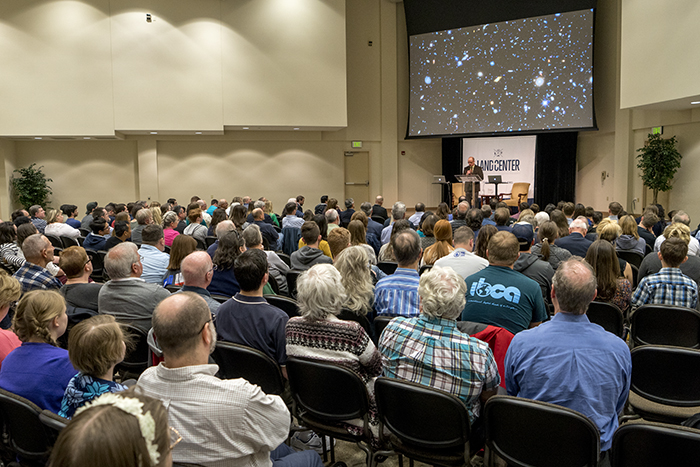Literature and science affirm man’s place in God’s universe, scholars agree

Man looks to both literature and science as he seeks to know his place in the universe, two authorities in their fields agreed at “Astrophysics and Fantasy—Hubble Meets Narnia,” an examination of the universe presented by Southwestern Seminary’s Land Center for Cultural Engagement. The March 20 discussion explored this quest for clarity from theological and scientific standpoints, including the perspectives of Chronicles of Narnia author C.S. Lewis, as mankind assesses its role.
Michael Ward, a senior research fellow at the University of Oxford and a professor of apologetics at Houston Baptist University, addressed Lewis’ mission to deepen man’s understanding of the universe. Ward is the author of Planet Narnia: The Seven Heavens in the Imagination of C.S. Lewis.
Citing Psalm 8:3-19, Ward noted that man has pondered his place in the universe since biblical times. He observed how David was moved by the majesty of the celestial bodies at night and reflected on man’s frailty in the face of God’s handiwork and mankind’s role in God’s great plan.
Ward recalled that while Lewis was best known as an academic and literary historian, he was deeply interested in astronomy, particularly the work of Copernicus, who revolutionized astronomy in the mid-1500s with his model of the Earth and planets revolving around the sun. Medieval cosmology and Copernicus’ findings that “relocated our home planet, Earth” fascinated Lewis throughout his life and inspired his Narnia series of books. Lewis was aware that Earth is not the center of the universe, and he observed that the planet is surrounded by the heavens and seven planets, with symbolism assigned to each.
Lewis often visited the local observatory and was well-schooled there, Ward said. “He had a personal engagement with the beauty of the heavens. His interest was not as an astrophysicist, but in the planets’ role in literature and culture. He was fascinated by the thought of planets of unbelievable majesty and constellations undreamed of.”
While science concludes that there is no center to the universe, an individual might view himself as the center, Ward said. He continued, “Lewis said you can’t operate in both modes simultaneously.” Ward reflected on the differences in viewing one’s place in the world from the outside or inside—as an observer of the world, or focused on one’s own place.
“To you, your own brain is your mind, while to others it is a cluster of neurons flashing,” Ward said. Similarly, he continued, “God is viewed differently from without and within.”
“Lewis sees planetary relationships as symbolic of our situation with God, where we are all situated within Him. He sees the planets as God’s handiwork, where His voice goes out to the ends of the world.”
Following Ward’s presentation, Anton M. Koekemoer covered the “Hubble” portion of the evening. A research astrophysicist whose work includes maintaining the scientific integrity of the Hubble Space Telescope, Koekemoer’s research focuses on the properties of galaxies and black holes and their growth over cosmic time.
Koekemoer began his talk with an observation that the Hubble telescope has been key to making the most precise measurements to date of the expansion rate of the universe. Images captured by the Hubble have provided man’s deepest views of the universe and exciting astronomical discoveries about the universe, including distant galaxies, black holes and giant clouds of star formations, he said. The Hubble’s Deep Field images, compiled over a 10-year period, have revealed more than 10,000 galaxies of various shapes, sizes, colors and ages.
Koekemoer believes that the Hubble’s discoveries confirm that the viewpoints of science and faith are fully reconciled. “The Hubble gives us a picture of what the universe is like,” he said. “These distances cannot even be described in miles, only in light years. But this is where science stops. From my perspective as a Christian, the observation of this proves that God created this universe.”
While science is focused on explaining the physical processes observed in the universe, deeper questions such as the meaning of man’s existence must be considered from the standpoint of religion, Koekemoer said, adding that individuals arrive at their own understanding of these questions. He continued that science reveals attributes about God, enriching faith for those who already have faith.
“Scripture teaches about God’s attributes,” he said. “Science reveals the extent of these attributes, enriching the faith of believers who contemplate it.”



